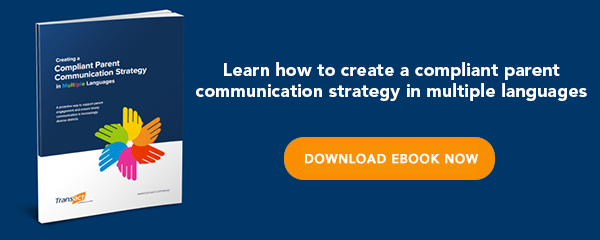Deferred Action for Childhood Arrivals or DACA is an Obama-era executive action that provides protections to undocumented immigrants that were brought into the U.S. when they were under age 16. The rationale behind DACA is that children cannot be held responsible for the actions of the adults that brought them into the U.S. and without some protections they could face dire circumstances.
Read MoreDr. David Holbrook

Recent Posts
Education Rights for Undocumented Students Unaffected by Trump Cancelling DACA
English Language Proficiency Standards and Reading/Language Arts Content Standards: What’s the Difference?
Over the years that I have worked with students learning English (English learners or ELs), I have met a number of well-meaning educators and parents that don't understand the difference between English Language Proficiency (ELP) standards and English content standards also know as reading/language arts content standards. For some parents and educators that don't have training or experience working with ELs, the idea that there are two types of English standards is confusing.
So, I (and a number of my colleagues) was glad to see that the U.S Department of Education (USED) recently published guidance that specifically addressed this issue.
Read MoreIncreased Rigor for Content Standards Impacts the Amount of Students in EL Programs
Education Week recently published an article about the increased rigor in the new English Language Proficiency (ELP) test (assessment) ACCESS 2.0. ACCESS 2.0 is the ELP test made available through the WIDA consortium. According to the EdWeek article, and several other articles that have been published on this topic, significantly fewer English Learners (ELs) tested proficient in English on ACCESS 2.0 in comparison to previous years when the previous version of this test was used.
Read MoreCan ESEA (ESSA) Funds be used to Pay EL Teacher’s Salaries?
When I was employed at a state department of education, I monitored school districts for compliance with ESEA requirements for both Title I and Title III. I also contracted with the U.S. Department of Education (USED) and helped USED monitor Title III in five states. One of the most common English Learner (EL) program monitoring issues I found was an improper use of Title I or Title III funds to pay for the salaries of teachers working in a district’s core “language instruction educational program” (LIEP), also know as an EL program.
Read MoreAre Charter Schools Considered School Districts or just Schools?
The Every Student Succeeds Act (ESSA) went into effect at the beginning of the 2017-18 school year, forcing districts across the country to evaluate, re-write, and re-translate the parent and family notifications that are required under the law. During a webinar training about the required changes (recorded July 24, 2017), the question was raised, “Which letters do charter schools use to schedule a Parent and Family Engagement Policy development meeting, the ‘school’ level letter or the ‘district’ level letter?”
Read MoreSection 508 Compliance and TransACT Parent Notices
TransACT Parent Notices is an online subscription for educators and administrators to manage their federal parent communication requirements. We offer expertly written, legally reviewed parent notifications in multiple languages, guidance on important requirements, and access to expertise to support understanding federal requirements under the Every Student Succeeds Act, Section 504, and IDEA.
Occasionally, we receive questions about whether our Parent Notices and software as a service (SAAS) platform comply with the Section 508 Standards of the Rehabilitation Act of 1973, as amended (29 U.S.C. § 794(d)). This can be a point of confusion because Section 504 of the Rehabilitation Act specifically applies to school districts serving students with disabilities, but Section 508 of the Rehabilitations Act applies only to Federal Agencies (not to States or school districts).
The Section 508 standards for accessibility for individuals with disabilities apply to Federal Agencies, in the development, procurement, maintenance, or use of electronic and information technology. The Section 508 standards do not apply to States and school districts because these agencies are not Federal Agencies. TransACT products are purchased by States and school districts. The Section 508 standards do not apply to TransACT because Federal Agencies do not engage in the procurement of TransACT products.
For more information on a subscription to compliant parent notifications in multiple languages for ESSA, Section 504 and IDEA for your district, request a demonstration here.
Read MoreThe Issue of N-Size in EL Accountability under ESSA
The National Council of State Title III Directors (NCSTIIID) hosted national meetings in Los Angeles, CA, jointly with the Council of the Great City Schools Bilingual Directors on May 16th and 17th. While many topics were discussed, one of the top concerns brought up by Title III Directors relates to the potentially significant reduction in the number of ELs that will be included in accountability determinations for making progress toward English proficiency under ESSA (the Elementary and Secondary Education Act as amended by the Every Student Succeeds Act 2015).
Read MoreAnti-Lunch Shaming Bill Introduced by the U.S. House of Representatives
The “Anti-Lunch Shaming Act of 2017” was recently introduced in the U.S. House of Representatives. The purpose of the bill is to prohibit school practices that single out students with unpaid meal debts. To become law, the bill would have to pass both the House and the Senate and be signed by the President.
Read MoreUSED Issues School Improvement Interventions Letter: Fails to Address Title III Improvement Issues
Shortly before the Trump administration took office, the U.S. Department of Education (USED) issued a Dear Colleague Letter (DCL) (January 13, 2017) to State Education Agencies (SEAs) regarding the timeline for and provision of interventions in schools identified for improvement. The DCL covered Title I school improvement interventions for the 2017-2018 school year (SY) for both Focus and Priority schools under ESEA Flexibility and schools identified for Improvement, Corrective Action, or Restructuring under NCLB. In addition, it provided a timeline for when schools should be identified for ESSA school improvement as either Comprehensive Support and Improvement schools or Targeted Support and Improvement schools.
Read MoreESSA Aligned Private School Consultation and Ombudsman Notices Required Before the July 1st ESSA Deadline
The most recent reauthorization of the Elementary and Secondary Education Act (ESEA), the Every Student Succeeds Act (ESSA), goes into full implementation on July 1, 2017. After July 1st all ESEA notices need to align with ESSA requirements.However, some ESSA notices are required or needed prior to the July 1st date. One category of notices needed is the Private Schools Consultation notices.
Read MorePOSTS BY TOPIC
- ESSA (107)
- Parent Engagement (69)
- EL (59)
- Civil Rights (43)
- USED (19)
- KPI (15)
- Operations Performance (12)
- McKinney-Vento (10)
- charter schools (5)
- compliance software (5)
- homelessness (4)
- ARP (3)
- American Rescue Plan (3)
- CARES Act (3)
- CRRSA (3)
- Corporate/Product News (3)
- ESSER (3)
- Education (3)
- HIMSS (3)
- Native American Education (3)
- Student Support (3)
- Transportation (3)
- After School Programs (2)
- CGCS (2)
- COVID (2)
- CRRSA Act (2)
- Charter School Governance Platform (2)
- Charter School Leaders (2)
- OST (2)
- School Communication Plan (2)
- Student Success (2)
- 21CCLC (1)
- AI (1)
- Artificial Intelligence (1)
- Board Meetings (1)
- Cloud Technologies (1)
- DACA (1)
- Data Compliance (1)
- Release Notes (1)
- Routing (1)
- charter board ceo (1)
- charter school staff (1)



